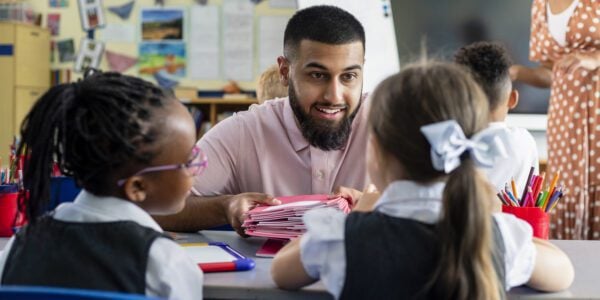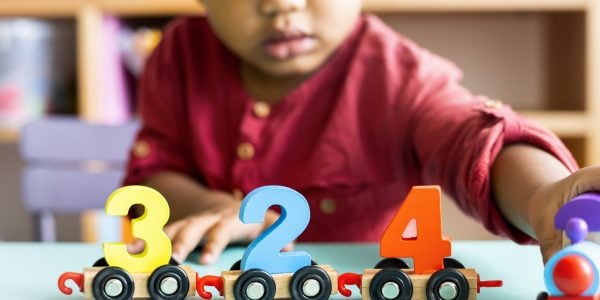
01/05/20
3 min read
An independent evaluation by the Education Endowment Foundation (EEF) has found that the Nuffield Early Language Intervention (NELI) boosts the language skills of four- and five-year olds by an additional three months. These results suggest the programme could be a promising way to help children catch up when schools reopen.
193 schools across England took part in the large-scale effectiveness trial of the Nuffield Early Language Intervention. The trial tested the programme in everyday conditions and the findings have a very high level of security, which means that the EEF has a high level of confidence in the results.
Developed by Nuffield-funded academics, NELI is published by Oxford University Press and delivered by the University of Oxford in partnership with Elklan.
About the NELI effectiveness trial
Teaching assistants were given two half days of training and detailed lesson plans so they could lead short, structured sessions, often around everyday topics, such as ‘time’ and ‘what we wear’, with small groups of reception-age pupils. Rewarding the children was an integral feature of each session, from targeted verbal praise to more formal incentives like a ‘best listener award’, given to a child who had listened well in the group.
The independent evaluation, by a team from RAND Europe led by Alex Sutherland and Sonia Ilie, found that pupils who took part in the programme made, on average, three months’ more progress in language skills than a group of similar children who did not receive the intervention. The evaluators also found that the programme was an effective way of boosting language skills for children with English as an additional language (EAL).
Closing the early language gap
Early language skills are vital for children’s long-term success in education and other areas. Research has shown that children with more advanced language skills at the age of five are more likely to have better qualifications and subsequently be employed in adulthood compared with their peers. However, disadvantaged children are more likely to have fallen behind before school starts.
School and nursery closures could lead to a widening of the early language gap between disadvantaged pupils and their peers. Today’s findings suggest that NELI could be an effective way for schools to help young children who have fallen behind during school closures catch-up with their peers.
An earlier, smaller trial of the programme found similar, promising results. The EEF is now exploring ways to scale-up the programme across a large number of schools and nurseries.
Professor Becky Francis, CEO of the Education Endowment Foundation, said:
“School closures are likely to mean those children and young people who were already struggling, fall further behind. While schools are working hard to mitigate against this, in the long-term, we need to focus on how best to help pupils bounce back when schools open again. Catch-up teaching targeted especially at those who have fallen furthest behind during this period will be essential.
“This is why today’s findings are so important. It is always welcome to find good evidence that a particular programme or approach is likely to boost outcomes, but today’s result suggest that this programme could be a particularly effective way of helping young children whose language skills have been particularly affected by school closures catch-up when they reopen.”
Josh Hillman, Director of Education at the Nuffield Foundation said:
“We are delighted that this EEF large-scale randomised controlled trial has shown NELI to be a low-cost intervention which improves children’s language skills by an average of three months. When children go back to the classroom later this year, effective, school-based interventions like NELI will be crucial to closing the ‘disadvantage gap’ which will inevitably widen whilst schools and nurseries are closed during the COVID-19 crisis.”
Professor Charles Hulme and Professor Maggie Snowling, University of Oxford, said:
“Our research focuses on children’s language and literacy development with a special emphasis on how to help children who find learning language and literacy skills difficult. A strong foundation in oral language is key to children’s success in education.
“We are delighted that this most recent EEF trial of the Nuffield Early Language Intervention delivered in partnership with Elklan who provided the teacher and TA training has produced such strong evidence of its effectiveness. We hope that schools will be encouraged to adopt the programme for the benefit of the many children whose educational progress is hindered by language difficulties.”
EEF evaluation
-
Evaluation reporthttps://educationendowmentfoundation.org.uk/pdf/generate/?u=https://educationendowmentfoundation.org.uk/pdf/project/?id=1713&t=EEF%20Projects&e=1713&s=01 May 20
-
Printable project summaryhttps://educationendowmentfoundation.org.uk/pdf/generate/?u=https://educationendowmentfoundation.org.uk/pdf/project/?id=1713&t=EEF%20Projects&e=1713&s=01 May 20




















































